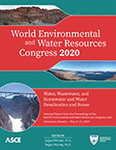World Environmental and Water Resources Congress 2020
A Cost-Optimization Tool for Stormwater Management Plans Using Green Infrastructure Practices
Publication: World Environmental and Water Resources Congress 2020: Water, Wastewater, and Stormwater and Water Desalination and Reuse
ABSTRACT
Green infrastructure practices (GIPs) are a set of design principles, practices, and engineered devices that capture and treat stormwater runoff at its source using natural processes such as infiltration and evapotranspiration. Green infrastructure can reduce the effects of increased impervious area associated with land development by reducing the amount of runoff generated on a site and improving the water quality of the runoff. A methodology was developed using the runoff reduction method to size media-based GIPs and select the minimum cost site design. For most developments, green infrastructure practices alone are not adequate for attenuation of peak runoff flows to pre-development levels for large rain events and conventional stormwater management devices such as detention basins must be used to control runoff flows. The storm water management model (SWMM) was used to generate pre-development and post-development hydrographs for an example application and calculate design criteria for a detention basin. A cost optimization model was developed using the general algebraic modeling system (GAMS) for the design of a detention basin. This analysis was part of an ongoing research effort to develop techniques for green infrastructure cost optimizations, and the results were consequential in the development of a planning-level optimization tool for stormwater management.
Get full access to this article
View all available purchase options and get full access to this chapter.
5. REFERENCES
Alabama Department of Transportation (ALDOT). (2014). “Determining Runoff For Small Storm Events.” https://www.dot.state.al.us/dsweb/divped/Stormwater/pdf/DeterminingRunoffforSmallStormEvents.pdf. (November 6, 2019).
City of Birmingham. (2019). “Post Construction Storm Water Design Manual.” PDF. (April 21, 2019).
Collins, K. A., Hirschman, D., Hoffmann, G., Schueler, T., & Engineer, W. R. (2009). The Runoff Reduction Method. World Environmental and Water Resources Congress.
Damodaram, C., & Zechman, E. M. (2013). Simulation-Optimization Approach to Design Low Impact Development for Managing Peak Flow Alterations in Urbanizing Watersheds. Journal of Water Resources Planning and Management, 139(3), 290–298. https://doi.org/10.1061/(ASCE)WR.1943-5452.0000251
Damodaram, C., Giacomoni, M. H., Prakash Khedun, C., Holmes, H., Ryan, A., Saour, W. and Zechman, E.M., (2010), Simulation of Combined Best Management Practices and Low Impact Development for Sustainable Stormwater Management. JAWRA Journal of the American Water Resources Association, 46(5), pp.907-918.
EPA. (2009). “Storm Water Management Model Applications Manual.” PDF. (November 14, 2019).
EPA. (2017). “Opti-Tool for Stormwater and Nutrient Management User’s Guide.” https://www3.epa.gov/region1/npdes/stormwater/ma/opti-tool-user-guide.pdf. (November 14, 2019).
GAMS Development Corporation. (2019). “Good NLP Formulations.” https://www.gams.com/latest/docs/UG_NLP_GoodFormulations.html. (December 12, 2019).
Giacomoni, M. H., & Joseph, J. (2017). Multi-Objective Evolutionary Optimization and Monte Carlo Simulation for Placement of Low Impact Development in the Catchment Scale. Journal of Water Resources Planning and Management, 143(9), 04017053. https://doi.org/10.1061/(ASCE)WR.1943-5452.0000812
Lacy, M. (2016). Optimization Model for the Design of Bioretention Basins with Dry Wells. Thesis. https://pdfs.semanticscholar.org/fc03/01834ce9059e94496bc007277e0f82791715.pdf. (April 21, 2019).
Mays, L. W. (2011). Water resources engineering (2nd ed.). Hoboken, NJ: John Wiley & Sons, Inc.
NRCS (1986). Urban Hydrology for Small Watersheds, Technical Release No. 55 (TR-55). US Department of Agriculture, US Government Printing Office, Washington, DC.
Oxley, R. L., & Mays, L. W. (2014). Optimization – Simulation Model for Detention Basin System Design. Water Resources Management, 28(4), 1157–1171. https://doi.org/10.1007/s11269-014-0552-z
Park, M., Chung, G., Yoo, C., & Kim, J.-H. (2012). Optimal design of stormwater detention basin using the genetic algorithm. KSCE Journal of Civil Engineering, 16(4), 660–666. https://doi.org/10.1007/s12205-012-0991-0
Perez-Pedini, C., Limbrunner, J. F., & Vogel, R. M. (2005). Optimal Location of Infiltration-Based Best Management Practices for Storm Water Management. Journal of Water Resources Planning and Management, 131(6), 441–448. https://doi.org/10.1061/(ASCE)0733-9496(2005)131:6(441)
Pitt, R. (1987). Small Storm Flow and Particulate Washoff Contributions to Outfall Discharges. Ph.D dissertation, Department of Civil and Environmental Engineering, the University of Wisconsin, Madison. Stafford et al. 2015
Urbonas et al. (2017). “BMP-REALCOST: Best Management Practices – Rational Estimation of Actual Likely Costs of Stormwater Treatment.” User’s Manual and Documentation. PDF. (April 21, 2019).
Yeh, C.-H., & Labadie, J. W. (1997). Multiobjective Watershed-Level Planning of Storm Water Detention Systems. Journal of Water Resources Planning and Management, 123(6), 336–343. https://doi.org/10.1061/(ASCE)0733-9496(1997)123:6(336)
Zhen, X.-Y. “Jenny,” Yu, S. L., & Lin, J.-Y. (2004). Optimal Location and Sizing of Stormwater Basins at Watershed Scale. Journal of Water Resources Planning and Management, 130(4), 339–347. https://doi.org/10.1061/(ASCE)0733-9496(2004)130:4(339)
Information & Authors
Information
Published In
World Environmental and Water Resources Congress 2020: Water, Wastewater, and Stormwater and Water Desalination and Reuse
Pages: 52 - 59
Editors: Sajjad Ahmad, Ph.D., and Regan Murray, Ph.D.
ISBN (Online): 978-0-7844-8298-8
Copyright
© 2020 American Society of Civil Engineers.
History
Published online: May 14, 2020
Published in print: May 14, 2020
Authors
Metrics & Citations
Metrics
Citations
Download citation
If you have the appropriate software installed, you can download article citation data to the citation manager of your choice. Simply select your manager software from the list below and click Download.
